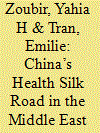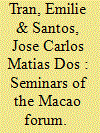|
|
|
Sort Order |
|
|
|
Items / Page
|
|
|
|
|
|
|
| Srl | Item |
| 1 |
ID:
184741


|
|
|
|
|
| Summary/Abstract |
The COVID-19 pandemic has offered China a unique opportunity for worldwide deployment of its longstanding health diplomacy, renamed the Health Silk Road (HSR), now an integral part of its Belt and Road Initiative. As a self-proclaimed South-South collaborator and developer,1Beijing has assumed a leadership role, grounded in ‘moral realism’, in the world’s health governance. Beijing’s health diplomacy has received acclaim in the Middle East and North Africa (MENA). However, the pandemic has exacerbated preexisting tensions between China, the United States (US) and European Union (EU). Western countries, wary of China’s rising power, reacted resentfully, confirming underlying systemic rivalry. This article argues that the currently disputed, or shifting, world order accounts for the diametrically opposed reactions between the West and the MENA toward China’s Health Silk Road.
|
|
|
|
|
|
|
|
|
|
|
|
|
|
|
|
| 2 |
ID:
164775


|
|
|
| 3 |
ID:
138449


|
|
|
|
|
| Summary/Abstract |
This article reviews the role that the Macao Special Administrative Region (SAR) plays in China’s cultural and public diplomacy through training programmes organised by the Macao Forum and tailored for the elite of the world’s Portuguese-speaking countries (PSCs). It begins with a review of China’s approach to key instruments of its soft-power offensive and strategy towards the developing world, followed by an overview of Beijing’s linkages with each PSC. Formulated as an expression of China’s cultural diplomacy towards the PSCs, the seminars of the Macao Forum serve as a kind of cooperation in which the provider party—rather than delivering tangible goods and services such as food, money, loans or infrastructure—actually offers grey matter in the form of ideas for initiatives in public policies and reforms, in order to foster further economic development and administrative rationalisation. Adding to an intense debate and substantial literature that discuss quantitatively and qualitatively China’s role in and aid provision to Africa, the authors argue that China, through the Macao Forum’s training programmes, courts the developing PSCs by building the capacity of their human capital, targeting in particular those in the public and private sectors who are in a position to implement their ideas.
|
|
|
|
|
|
|
|
|
|
|
|
|
|
|
|
|
|
|
|
|